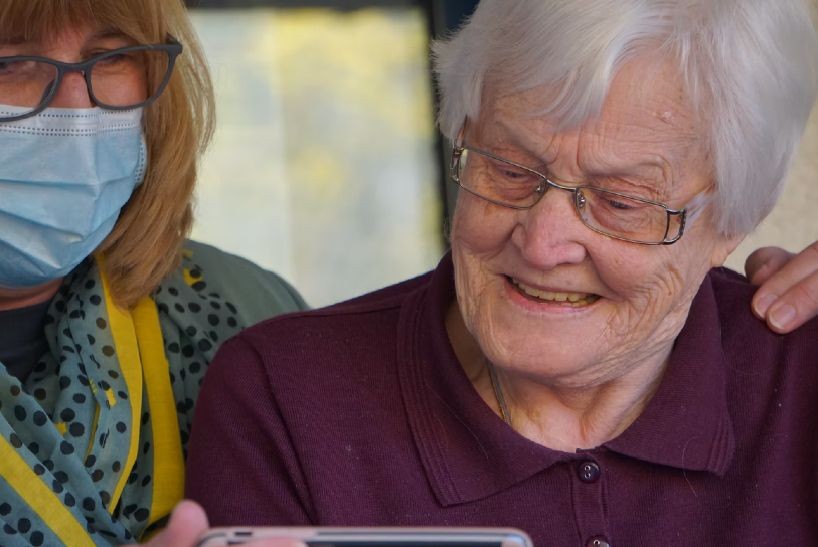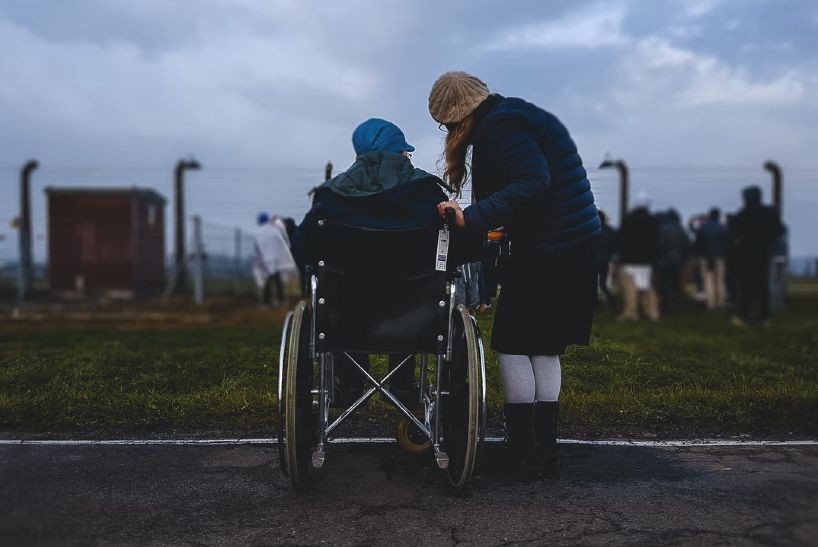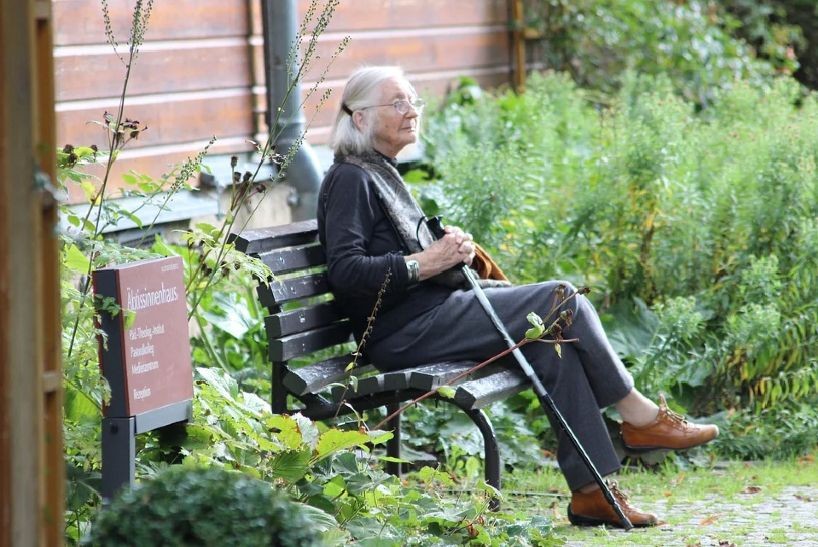How digitalization changes Spitex's role
Specialist topics
How digitalization changes Spitex's role
Digitalization has never offered more opportunities than it does today, and it has never been more present in all of our lives. This applies not only to our private lives, but also to our professional lives. The world of work is also undergoing an ever-increasing digital transformation. Will it change the role of Spitex?

The digitalization of the outpatient care sector is inevitable and urgently needed. Society is ageing, as people's life expectancy is constantly increasing thanks to comprehensive medical care options. This presents Spitex organizations with a major challenge. More and more older people want to spend the rest of their lives within their own four walls.
They are therefore deciding against moving into nursing homes or assisted living. This means an enormous increase in the need for specialists in Spitex organizations. At the same time, however, there is an increasing shortage of specialist staff. This makes it all the more important to relieve Spitex employees as much as possible. Numerous organizations have already digitized the following tasks:
- Documentation
- billing
- route planning
However, there are already a wide range of more far-reaching aids available, such as technical assistance systems or support from the field of robotics. However, these do not yet seem to have arrived in Spitex organizations. This may be one of the reasons why it is sometimes claimed that the care sector is closed to technological progress. But this is not the case
How Spitex employees feel about digitalization

Care is a field of work that does not focus on a product, but on people who need support. Professionals cannot always maintain routine processes, as each client has individual needs that no algorithm can meet. The interaction that takes place on site can therefore only be digitized to a limited extent.
Every day, Spitex specialists balance the client's self-determination with controlling elements that safeguard their health and well-being. In order for this act to continue to be guaranteed, digitization in the area of care must take place around the client. Professional care staff and managers of Spitex organizations are by no means closed to the topic of digitalization.
It is no secret how important technological progress is in care in order to relieve the burden on employees. Any fears that digitalization could lead to job losses are also unfounded. Even the most intelligent care robot will not be able to replace direct contact between client and carer.
And that is not the aim of the digital upswing. Rather, it is about relieving the burden on employees. The increased use of technology allows them to devote more time to personal contact with clients. This significantly increases the satisfaction and well-being of the people receiving care. Professionals and clients therefore benefit equally from digitalization.
What criticisms are there of digitalization and the associated role of Spitex?
It cannot be said across the board that every single Spitex professional is generally fully in favour of digitalization. Even if large parts of the nursing staff do see opportunities in technologization, others are somewhat more sceptical. In nursing, the focus has never been on technology, but always on people, and this is still true today.
This is why all the changes that digitalization brings in this area are completely new territory for many professionals. Initial skepticism towards change is normal, but the question is how long this will last. In order to convince every single care worker, the technical innovations first have to prove themselves.
Questions also arise such as: Can the advance of digitalization counteract the acute shortage of skilled workers? This cannot currently be answered with a clear "yes". As already mentioned, technology cannot replace direct contact between two people. And that is not the goal either. It is to relieve the burden on care staff, but not everyone feels it.
Discussions with various organizations have revealed that some Spitex specialists see new computer programs and software more as an obstacle. It takes too long to get to grips with them, and that takes up valuable time that could be used for other purposes.
Concerns about restrictions and efficiency pressure

Another point of criticism that is mentioned from time to time is that the work appears to be increasingly process-oriented. In the eyes of some Spitex specialists, the client being cared for is taking a back seat. What is increasingly occurring, however, is the restriction of the freedom that is necessary for individual care.
Some nursing staff fear that the use of modern technologies could lead to increased performance monitoring. On the one hand, this would be an advantage to ensure that each client receives exactly the services they need.
On the other hand, this increases the pressure on professionals to be efficient. However, according to experts, this pressure is by no means a result of digitalization. It is increasing due to financing in the sector, which is why work now has to be documented in ever greater detail.
It is possibly this additional administrative effort that is causing some Spitex professionals to be sceptical about digitalization. However, it is also emphasized that the possibilities of technologization can develop into a great opportunity, provided they are used correctly. Carefully selected devices and apps can certainly make documentation easier and even create more freedom instead of taking it away.
Focus technologies in the care sector
Anyone who takes a close look at the topic of technology in care will notice that four focus technologies are often mentioned. These are
- Electronic documentation
- assistance technologies
- telecare
- robotics
Planning and coordinating the care assignments of Spitex employees is no easy task. There are always changes at short notice that need to be integrated into the duty and route planning as quickly as possible. Digital systems can take over this task. The same applies to the obligatory documentation of the services provided. The entry of all information can be accelerated with the help of partially automated processes and various default settings.
The second focus technology - assistance systems - is integrated directly into the client's living environment. The systems are a combination of modern, networked information and communication technologies. Examples include systems that remind people to take their medication and exoskeletons worn by care staff.
The latter are intended to help Spitex employees to move people in need of care and thus prevent work-related back problems, for example. Assistance systems can also be used in the context of telecare. This third focus technology is based on the provision of services at a distance. This is particularly useful in rural areas, where Spitex employees often have to travel long distances.

Various data, such as blood sugar or blood pressure values, which the client can record themselves, are automatically forwarded to Spitex. If a client falls, sensors trigger an alarm and inform the Spitex specialists responsible. The same applies if the client has not moved for an unusually long time, to name just a few examples.
Telecare therefore offers the opportunity to support and monitor clients, even when there is no caregiver on site. However, robotics has even greater potential. This is by no means about robots replacing nursing staff. Rather, they support them physically and mentally. For example, robotics can provide support for difficult tasks and routine procedures that can be programmed.
Is digitalization changing the role of Spitex?
Despite all the possibilities that technology offers in the field of care, the role of Spitex is not changing. It remains an indispensable element in enabling older people to live as long as possible in their familiar surroundings. Spitex specialists maintain the independence of their clients for as long and as extensively as possible and play a key role in helping them to age with dignity.
Digital advances in care do nothing to change this. Professionals will remain an important support in the lives of clients, even if technology may one day be able to take over many tasks. What will remain unchanged is every person's desire to interact socially, show emotions and receive genuine responses. Only flesh-and-blood Spitex professionals can meet these needs.
Are you looking for a suitable Spitex service in your area for yourself or a relative? We at OPAN® will help you find a suitable organization and will be happy to provide you with comprehensive advice. Please contact us by e-mail or give us a call.
